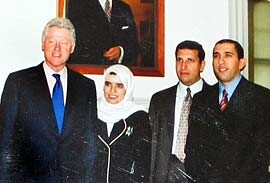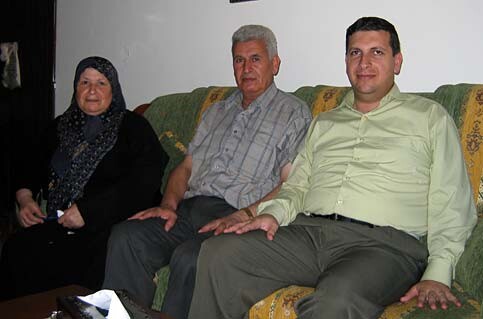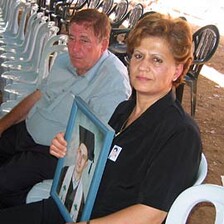
Mu’aath’s mother with a poster of her son. (Photo: Rima Merriman)
In telling the story of his son’s imprisonment, Mohammad Samarah reflects on an irony that seems to him sad and inspirational at the same time. His youngest son, Mu’aath (27), is being held at an Israeli prison called Jalbou’. It’s a new prison north of Jenin in the Jalboun hills built to replace an older prison by the same name that was located in the Palestinian village of Shatta.
The irony, Mohammad Samarah explains, lies in the fact that his family comes from a village in Jalboun called Noores. The Israelis have wiped out this Palestinian village, but overlooking its ruins, there is now an Israeli “settlement” tauntingly echoing what used to be by calling itself Nooret. It seems to Muhammad that Mu’aath has returned to his family region in the only way he could return.
Another detail related to the location of his son’s prison that gives Mohammad a measure of pride, if not comfort, is that this Jalbou’ prison, where Mu’aath is serving a 5-year sentence, is also close to another destroyed village called al Mazar, best known for giving refuge to the Palestinian resistance fighter Farhan al Sa’adi, who was hanged by the British Mandate in 1936 for his part in the rebellion of Izz al Din al Qassam. Qassam was himself killed in 1935 in the fields of Ya’abad, also in the Jalboun area.
The new prison is rumored to use tactics similar to those used against Northern Irish prisoners. In particular, the courtyard outside the cells (the “forah” in Arabic) is covered by corrugated iron, which in this hot region forms a hellish greenhouse effect. Mohammad cannot be certain of these details, as he and his family have been denied visits to their son. But this is what he has heard. The prison has been described by those incarcerated there as “Slow death quarters.”

Mu’aath’s brother Rami with US president Bill Clinton. (Photo: Family Handout)
His second brother Nasr, who has a degree in agriculture from the University of Jordan, was working at the Palestinian Agriculture Relief Committee in Ramallah. His two sisters were with their husbands, one in Toulkarem and one in Saudi Arabia. His parents lived in Toulkarem, where his mother (Aisheh) was a schoolteacher until retiring recently. His father commuted to his job as a lab technician at Birzeit University. (Mohammad has a B.S. in chemistry from Baghdad University). As it happened, Mu’aath’s parents were staying with him at his apartment in Ramallah the night the soldiers came.

The entrance of the apartment where the soldiers entered to arrest Mu’aath, tracking in mud from the neighborhood soccer field. (Photo: Rima Merriman)
The soldiers came in with boots muddied from the undeveloped area close by the apartment building, where children had made a small soccer field. They asked for the men in the house, handcuffed Mohammad and Mu’aath and took them outside. They ransacked the house dragging in mud and wreaking havoc with the furniture. They took three cases that belonged to the three brothers without first opening them. These contained school papers, diplomas, and memorabilia. They arrested Mu’aath and took him away.
The following day, Mohammad and Aisheh went to the Mandela Institute for Political Prisoners to make enquiries. They learned that Mu’aath was at the Moskobiyeh, an Israeli investigation center in West Jerusalem, where he was being interrogated. His interrogation lasted for 45 days. They were advised to hire a lawyer, which they did with the help of Bir Zeit University. Mu’aath was then moved to Beit El, the Israeli military base in Ramallah near Beit El “settlement,” where he was imprisoned for a year and a half, while his case dragged on. His parents were not allowed to visit.
Most cases such as Mu’aath’s are resolved through plea bargaining. Evidence against Mu’ath consisted of whatever he had confessed to during interrogations (which routinely include torture) and what his friends might have reported against him, in addition to certain affiliations that are considered in themselves offenses against the state of Israel.
The accusations were as follows:
- Frequenting a certain place for the purpose of making explosives. (Mu’aath had admitted only to frequenting the place.)
- Being involved in the planning of “an operation.”
- Participating in student council elections at Birzeit University as part of the Islamic Bloc.
- Participating in a Hamas camp in 1991 (when Mu’aath was twelve years old.)
- Acting as the technical expert for a terrorist cell. This last accusation was based on something the interrogators had found in one of the cases that were taken from his apartment on the night of his arrest. It was the thesis for his B.A. degree, which dealt with a robotic mechanism for diffusing explosives.
Mu’aath’s hearing took place in a small room at Beit El. Only two relatives for each accused prisoner are allowed to attend, and the benches reserved for relatives hold four people at a time. His lawyer had plea bargained for a sentence of five years with an additional “reserved” sentence of three years. The three years are reserved for any future offence. Should Mu’aath be arrested and convicted again after his release, three years would automatically be added to his new sentence.
Mohammad and Aisheh have not seen their son since his sentence, nor have they had any contact with him whatsoever with the exception of two short letters, each arriving weeks after it had been written. They applied for visitation through the International Red Cross, but the Israelis denied their application.

Mu’aath’s family (from L-R): Aisheh (mother), Mohammad (father), Rami (oldest Brother). (Photo: Rima Merriman)
Related Links
Rima Merriman is a freelance writer and a communications specialist. She has been working in the West Bank for the past four months.





